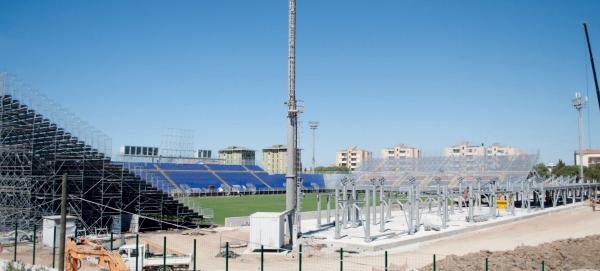
Cagliari’s stadium troubles took another twist this weekend, when their match versus AS Roma got cancelled after Cagliari club-president Massimo Cellino had invited the home fans to come to the stadium despite the local municipality having decided that the match had to be played behind closed doors as the makeshift stadium failed to get safety clearance.
We have already dedicated several articles to the background of the issues, but in short:
- After failing to get planning approval for a new stadium in the city of Cagliari, the club decided to leave the dilapidated Stadio Sant’Elia and build a temporary makeshift stadium, Stadio Is Arenas, in the nearby municipality of Quartu.
- Works started at the beginning of the summer, but soon became a race against time to be ready for the start of the season.
- The still-not-finished stadium failed to get safety clearance for Cagliari’s first league game versus Atalanta, which was played behind closed doors.
- The club had three weeks to make amendments for their next home fixture against Roma, but the stadium again did not meet safety checks, and local authorities decided that again no public was allowed.
The negative decision led to so much frustration with Cellino, that he invited fans to come anyway as in his opinion the stadium was perfectly adequate. The local authorities then decided to call off the match all together.
While some frustration on the side of Cellino is perfectly understandable, after all, his very reasonable plans for the Karalis Arena were axed by the inability of the city of Cagliari to overcome bureaucracy, his actions have become more radical and irresponsible in recent months.
First there was the hasty decision to move the last home matches of the previous season to far-away Trieste, leaving many fans in the cold. This decision, however, constituted relatively little harm.
His actions this weekend though, inviting fans to a stadium that was deemed unfit for use, could have had grave consequences.
While it is unknown what exactly the concerns of the local authorities were, it seems mainly documentation, the fact is that many fans have gotten injured and even lost lives in stadiums that had inadequate safety measures. There are furthermore some eerie similarities with the Furiani stadium disaster that happened only twenty years ago on the island of Corsica, just north of Sardinia.
That time, club directors rushed to build a similar makeshift scaffold-like stand for a Cup semi-final versus Marseille, ignored safety reports, and pressured local state representatives. Part of the stand collapsed right before the start of the match, which led to the death of 18 fans. The time-frame was much shorter then, just a few weeks, but in both cases there was significant time pressure, which is never good for safety.
It is unclear what Cellino tried to achieve when he made the announcement. Possibly, he had hoped to pressure the local government into allowing spectators at the game, but it was always more likely to backfire, and it is commendable that local representatives did not cave.
Cellino reacted with the odd excuse that it was he that avoided chaos as the ultras might turn up at the stadium and create the idea that all season ticket holders might get in. At the same time, he pushed back against criticism coming from FIGC and the Lega league body.
The result is that Cellino has not made many new friends over the weekend, not at the municipality that is planned to be the new home of the club for the next three years, nor at FIGC, Lega, and likely the general public.
The three points for the match have already been awarded to Roma, further punishments possibly await, and there is talk that penal action will be taken against Cellino.
One also wonders why Cagliari had not just made sure to have one proper stand ready for the new season, and then built the rest of the stadium over the next months. The club’s attendances rank among the lowest of the league, they only have a few thousand season ticket holders, could have asked Lega for some low-profile fixtures to start with, and even refused visiting fans (who are not generally that many in Italy).
Cagliari’s next home match already comes within a week, though it seems that this one will get played in Trieste again. Let’s hope that Cellino then finally gets his act together.
Photo credits: © Wikimedia user Gigidelneri